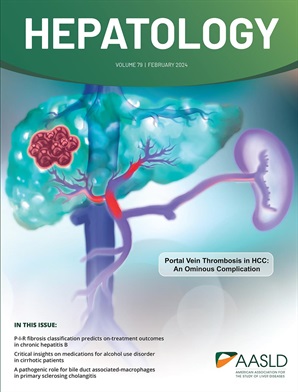对基于免疫疗法的全身疗法完全应答的肝细胞癌患者的疗效和管理
IF 12.9
1区 医学
Q1 GASTROENTEROLOGY & HEPATOLOGY
引用次数: 0
摘要
背景& 目的:肝细胞癌(HCC)患者对基于免疫检查点抑制剂(ICI)的全身疗法获得完全应答(CR)后的预后尚不清楚。方法& 结果:对来自亚洲、欧洲和美国 28 个中心的 HCC 患者进行回顾性研究,这些患者在接受基于 ICI 的系统疗法治疗后,根据 mRECIST 获得了 CR。在接受以 ICI 为基础的非根治性系统疗法治疗的 3933 例 HCC 患者中,有 174 例(4.4%)根据 mRECIST(CR-mRECIST)达到了 CR,97 例(2.5%)根据 RECISTv1.1(CR-RECISTv1.1)也达到了 CR。所有患者(男性,85%;BCLC-C,70%)的平均年龄为(65.9±9.8)岁。大多数患者(83%)接受了以 ICI 为基础的联合疗法。中位随访时间为32.2个月(95%CI,29.9-34.4个月)。1年和3年总生存率(OS)分别为98%和86%。仅CR-mRECIST和CR-RECISTv1.1患者的1年和3年无复发生存率(RFS)分别为78%和55%;70%和42%。在因复发以外的原因停用 ICIs 的患者中,在首次 mRECIST CR 后接受免疫疗法≥6 个月的患者的 RFS 比那些较早停用免疫疗法的患者长(P=0.008)。在接受根治性手术转换疗法的 9 名患者中,8 人(89%)达到病理 CR(CR-RECISTv1.1,n= 2/2;CR-mRECIST-only,n= 6/7)。结论纯CR-mRECIST和CR-RECISTv1.1患者的OS和RFS都很好,接受手术转换治疗的7名纯CR-mRECIST患者中,有6人达到病理CR。尽管存在潜在的局限性,但这些研究结果支持在免疫疗法的临床决策中使用 mRECIST。在考虑停用 ICI 时,治疗至少 6 个月超过 CR 似乎是明智之举。本文章由计算机程序翻译,如有差异,请以英文原文为准。
Outcome and management of patients with hepatocellular carcinoma who achieved complete response to immunotherapy-based systemic therapy
Background & Aims: The outcome of patients with hepatocellular carcinoma (HCC) who achieved complete response (CR) to immune-checkpoint-inhibitor (ICI)-based systemic therapies is unclear. Approach & Results: Retrospective study of patients with HCC who had CR according to mRECIST to ICI-based systemic therapies from 28 centers in Asia, Europe, and the United States. Of 3933 patients with HCC treated with ICI-based non-curative systemic therapies, 174 (4.4%) achieved CR according to mRECIST (CR-mRECIST) and 97 (2.5%) had CR according to RECISTv1.1 (CR-RECISTv1.1) as well. The mean age of the total cohort (male, 85%; BCLC-C, 70%) was 65.9±9.8 years. The majority (83%) received ICI-based combination therapies. Median follow-up was 32.2 (95%CI, 29.9-34.4) months. One- and 3-year overall survival (OS) rates were 98% and 86%. One- and 3-year recurrence-free survival (RFS) rates were excellent in patients with CR-mRECIST-only and CR-RECISTv1.1 (78% and 55%; 70% and 42%). Among patients who discontinued ICIs for reasons other than recurrence, those who received immunotherapy for ≥6 months after first mRECIST CR had a longer RFS than those who discontinued immunotherapy earlier (p =0.008). Of 9 patients who underwent curative surgical conversion therapy, 8 (89%) had pathological CR (CR-RECISTv1.1, n= 2/2; CR-mRECIST-only, n= 6/7). Conclusion: OS and RFS of patients with CR-mRECIST-only and CR-RECISTv1.1 were excellent, and 6 of 7 patients with CR-mRECIST-only who underwent surgical conversion therapy had pathological CR. Despite potential limitations, these findings support the use of mRECIST in the context of immunotherapy for clinical decision-making. When considering ICI discontinuation, treatment for at least 6 months beyond CR seems advisable.
求助全文
通过发布文献求助,成功后即可免费获取论文全文。
去求助
来源期刊

Hepatology
医学-胃肠肝病学
CiteScore
27.50
自引率
3.70%
发文量
609
审稿时长
1 months
期刊介绍:
HEPATOLOGY is recognized as the leading publication in the field of liver disease. It features original, peer-reviewed articles covering various aspects of liver structure, function, and disease. The journal's distinguished Editorial Board carefully selects the best articles each month, focusing on topics including immunology, chronic hepatitis, viral hepatitis, cirrhosis, genetic and metabolic liver diseases, liver cancer, and drug metabolism.
 求助内容:
求助内容: 应助结果提醒方式:
应助结果提醒方式:


